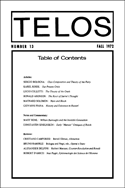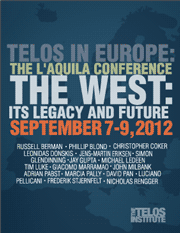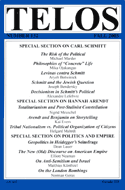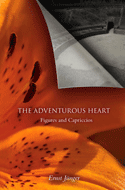By James Santucci · Tuesday, December 18, 2012 As an occasional feature on TELOSscope, we highlight a past Telos article whose critical insights continue to illuminate our thinking and challenge our assumptions. Today, James Santucci looks at Karel Kosík’s “Our Present Crisis” from Telos 13 (Fall 1972).
 Karel Kosík’s story begins with the end of a statue. In 1962, a granite statue of Stalin that had been begun in 1955 was completed only to be torn down several months later. For Kosík, the statue, “designed to last forever,” perfectly represented the provisionalism and nihilism of modern times. It laid bare the inescapable tension between living peacefully in social life and the animal brutality that occasionally became necessary. When the statue was torn down, the base was left behind. In Kosík’s time, there were plans to transform the space into a garden restaurant. The restaurant’s relationship to its past would be complicated, but plans were scrapped, which saved any Prague tourists from the awkwardness of “Would you like to see our drink menu while you contemplate what it means to live under threat of random and instantaneous erasure?” Karel Kosík’s story begins with the end of a statue. In 1962, a granite statue of Stalin that had been begun in 1955 was completed only to be torn down several months later. For Kosík, the statue, “designed to last forever,” perfectly represented the provisionalism and nihilism of modern times. It laid bare the inescapable tension between living peacefully in social life and the animal brutality that occasionally became necessary. When the statue was torn down, the base was left behind. In Kosík’s time, there were plans to transform the space into a garden restaurant. The restaurant’s relationship to its past would be complicated, but plans were scrapped, which saved any Prague tourists from the awkwardness of “Would you like to see our drink menu while you contemplate what it means to live under threat of random and instantaneous erasure?”
Continue reading →
By Danilo Breschi · Friday, December 14, 2012 This paper was presented at Telos in Europe: The L’Aquila Conference, held on September 7-9, 2012, in L’Aquila, Italy.
 It is with Tocqueville that the term democracy acquires a positive connotation. When the first part of Democracy in America appeared in 1835, the very title came as a surprise. It was radically new, and it struck people like a bolt from the blue. Tocqueville took another unprecedented step when he associated democracy and equality. According to Aristotle, equality is an aspect of justice, not democracy. The equality that Tocqueville had in mind was not political or economic, but social; it referred to a social condition arising from equality of condition and from a pervasive egalitarian ethos. The latter reflected, in turn, the absence of a feudal past in the New World. Back in Europe and France, Tocqueville lived through the events of 1848, when the notion of “revolution” gained a socialist character. It is at such point that Tocqueville perceives a conflict between socialism and liberty: socialism means equality without liberty, while democracy stands for equality and freedom. He thus starts a new debate, that of the problematic relationship between equality and liberty, which draws on his dual political experiences in Europe and America. He discovers that it is through their synthesis that a political system capable of combining the best aspects of liberty and equality might emerge. Liberal democracy could therefore be born of the encounter between Europe and America, that is to say, the two main parts of the Western World. It is with Tocqueville that the term democracy acquires a positive connotation. When the first part of Democracy in America appeared in 1835, the very title came as a surprise. It was radically new, and it struck people like a bolt from the blue. Tocqueville took another unprecedented step when he associated democracy and equality. According to Aristotle, equality is an aspect of justice, not democracy. The equality that Tocqueville had in mind was not political or economic, but social; it referred to a social condition arising from equality of condition and from a pervasive egalitarian ethos. The latter reflected, in turn, the absence of a feudal past in the New World. Back in Europe and France, Tocqueville lived through the events of 1848, when the notion of “revolution” gained a socialist character. It is at such point that Tocqueville perceives a conflict between socialism and liberty: socialism means equality without liberty, while democracy stands for equality and freedom. He thus starts a new debate, that of the problematic relationship between equality and liberty, which draws on his dual political experiences in Europe and America. He discovers that it is through their synthesis that a political system capable of combining the best aspects of liberty and equality might emerge. Liberal democracy could therefore be born of the encounter between Europe and America, that is to say, the two main parts of the Western World.
Continue reading →
By Frederick Wertz · Tuesday, December 11, 2012 As an occasional feature on TELOSscope, we highlight a past Telos article whose critical insights continue to illuminate our thinking and challenge our assumptions. Today, Frederick Wertz looks at Elliot Neaman’s “The New (Old) Discourse on the American Empire and the War in Iraq” from Telos 132 (Fall 2005).
 Critiques of American imperialism are easy to find at the domestic and the international level, especially in today’s partisan and reactionary political climate. The contemporary discourse is beginning to focus on the decline of the American empire, despite the fact that there is very little consensus as to whether or not America ever even had an empire to begin with, in any objective historical context. Critiques of American imperialism are easy to find at the domestic and the international level, especially in today’s partisan and reactionary political climate. The contemporary discourse is beginning to focus on the decline of the American empire, despite the fact that there is very little consensus as to whether or not America ever even had an empire to begin with, in any objective historical context.
In an article written in the midst of a heated debate about American imperialism and the War in Iraq, Elliot Neaman takes a step back from the fray and takes a look at the development of the contemporary discourse surrounding the issue. While the debate may or may not have evolved significantly from where it was in 2005, Neaman’s analysis of various critiques of American empire has enduring aspects that pertain far beyond the scope of American foreign policy. By looking at various pro- and anti-empire positions from both the Left and Right, we can draw meaningful lessons about the development of discourse and the interpretation of history.
Continue reading →
By Maxwell Woods · Monday, December 10, 2012 Ernst Jünger’s The Adventurous Heart: Figures and Capriccios is now available for the first time in English translation from Telos Press. Maxwell Woods spoke with the book’s translator, Thomas Friese, about the challenges of translating Jünger into English as well as the increasing relevance of the author’s writings to our current social and political landscape. Purchase your copy of The Adventurous Heart here.
 Maxwell Woods: In your preface to The Adventurous Heart, by Ernst Jünger, you write that “this book hooked me on the author for life.” What is it about this particular book that you found so captivating? Do you find yourself returning to this book in your studies of Jünger? Of Jünger’s work does this book hold a special place for you? Maxwell Woods: In your preface to The Adventurous Heart, by Ernst Jünger, you write that “this book hooked me on the author for life.” What is it about this particular book that you found so captivating? Do you find yourself returning to this book in your studies of Jünger? Of Jünger’s work does this book hold a special place for you?
Thomas Friese: First impressions obviously have special value, and The Adventurous Heart was my first encounter with Jünger. It was an ideal start, since this book is a concise introduction to the worldview of the mature author. Ideally, all new readers would come to Jünger via this book—there are certainly worse ways, which are unfortunately also more common—i.e., through Der Arbeiter or Storms of Steel, or, worse still, through clichéd second-hand opinions.
Continue reading →
By Andre Freudenberg · Thursday, December 6, 2012 No doubt, there are successful moderate right-wing conservative parties all over Europe. Their names may be different, but they have one thing in common: they grow stronger while forcing government to alter policies and solve problems caused by illegal immigration and tendencies toward more centralization within the European Union. Therefore, it becomes more and more difficult to eliminate public debate about those and other topics.
However, there is one big exception: Germany. A party comparable to the Austrian Freedom Party still doesn’t exist there. The five “big players” that are represented in the Bundestag (the national parliament) and in the Landtag (the federal state parliaments) are either left-wing or at the center. One example is the Christian Democratic Union (CDU), which is part of the current government coalition together with the Free Democratic Party (FDP). One may assume that only a small minority of the electorate sympathizes with the agenda of staunchly conservative groups. But surveys conducted last year strongly refute this assumption.
Continue reading →
By Marcia Pally · Wednesday, December 5, 2012 This paper was presented at Telos in Europe: The L’Aquila Conference, held on September 7-9, 2012, in L’Aquila, Italy.
 Whatever the ostensible theme of the September 2012 Telos conference, it seems the real one was the mess in the West. Has the West lost its pizzazz, gravitas, ability to guide? Have we become too secular, merely rational, and thus paradoxically ungrounded? Or are we not rational enough, our politics and economics still beset by emotional, quasi-religious beliefs? Whatever the ostensible theme of the September 2012 Telos conference, it seems the real one was the mess in the West. Has the West lost its pizzazz, gravitas, ability to guide? Have we become too secular, merely rational, and thus paradoxically ungrounded? Or are we not rational enough, our politics and economics still beset by emotional, quasi-religious beliefs?
From my perch, the West hasn’t lost anything but rather has gotten too much of what might be a good thing were there less of it. That thing is separability, and too much of it, untempered by situatedness, yields abandonment and anomie on one hand and selfishness on the other. Of course, too much situatedness would be equally damaging—oppressive and stultifying. It is the binary choice—separabilty or situatedness—that leads the West to the worst of itself. Thus what is needed are frameworks that foster the simultaneous presence of both. Here I’ll point to one, theologies of relationality.
Continue reading →
|
|
 Karel Kosík’s story begins with the end of a statue. In 1962, a granite statue of Stalin that had been begun in 1955 was completed only to be torn down several months later. For Kosík, the statue, “designed to last forever,” perfectly represented the provisionalism and nihilism of modern times. It laid bare the inescapable tension between living peacefully in social life and the animal brutality that occasionally became necessary. When the statue was torn down, the base was left behind. In Kosík’s time, there were plans to transform the space into a garden restaurant. The restaurant’s relationship to its past would be complicated, but plans were scrapped, which saved any Prague tourists from the awkwardness of “Would you like to see our drink menu while you contemplate what it means to live under threat of random and instantaneous erasure?”
Karel Kosík’s story begins with the end of a statue. In 1962, a granite statue of Stalin that had been begun in 1955 was completed only to be torn down several months later. For Kosík, the statue, “designed to last forever,” perfectly represented the provisionalism and nihilism of modern times. It laid bare the inescapable tension between living peacefully in social life and the animal brutality that occasionally became necessary. When the statue was torn down, the base was left behind. In Kosík’s time, there were plans to transform the space into a garden restaurant. The restaurant’s relationship to its past would be complicated, but plans were scrapped, which saved any Prague tourists from the awkwardness of “Would you like to see our drink menu while you contemplate what it means to live under threat of random and instantaneous erasure?”  It is with Tocqueville that the term democracy acquires a positive connotation. When the first part of Democracy in America appeared in 1835, the very title came as a surprise. It was radically new, and it struck people like a bolt from the blue. Tocqueville took another unprecedented step when he associated democracy and equality. According to Aristotle, equality is an aspect of justice, not democracy. The equality that Tocqueville had in mind was not political or economic, but social; it referred to a social condition arising from equality of condition and from a pervasive egalitarian ethos. The latter reflected, in turn, the absence of a feudal past in the New World. Back in Europe and France, Tocqueville lived through the events of 1848, when the notion of “revolution” gained a socialist character. It is at such point that Tocqueville perceives a conflict between socialism and liberty: socialism means equality without liberty, while democracy stands for equality and freedom. He thus starts a new debate, that of the problematic relationship between equality and liberty, which draws on his dual political experiences in Europe and America. He discovers that it is through their synthesis that a political system capable of combining the best aspects of liberty and equality might emerge. Liberal democracy could therefore be born of the encounter between Europe and America, that is to say, the two main parts of the Western World.
It is with Tocqueville that the term democracy acquires a positive connotation. When the first part of Democracy in America appeared in 1835, the very title came as a surprise. It was radically new, and it struck people like a bolt from the blue. Tocqueville took another unprecedented step when he associated democracy and equality. According to Aristotle, equality is an aspect of justice, not democracy. The equality that Tocqueville had in mind was not political or economic, but social; it referred to a social condition arising from equality of condition and from a pervasive egalitarian ethos. The latter reflected, in turn, the absence of a feudal past in the New World. Back in Europe and France, Tocqueville lived through the events of 1848, when the notion of “revolution” gained a socialist character. It is at such point that Tocqueville perceives a conflict between socialism and liberty: socialism means equality without liberty, while democracy stands for equality and freedom. He thus starts a new debate, that of the problematic relationship between equality and liberty, which draws on his dual political experiences in Europe and America. He discovers that it is through their synthesis that a political system capable of combining the best aspects of liberty and equality might emerge. Liberal democracy could therefore be born of the encounter between Europe and America, that is to say, the two main parts of the Western World.  Critiques of American imperialism are easy to find at the domestic and the international level, especially in today’s partisan and reactionary political climate. The contemporary discourse is beginning to focus on the decline of the American empire, despite the fact that there is very little consensus as to whether or not America ever even had an empire to begin with, in any objective historical context.
Critiques of American imperialism are easy to find at the domestic and the international level, especially in today’s partisan and reactionary political climate. The contemporary discourse is beginning to focus on the decline of the American empire, despite the fact that there is very little consensus as to whether or not America ever even had an empire to begin with, in any objective historical context.  Maxwell Woods: In your preface to The Adventurous Heart, by Ernst Jünger, you write that “this book hooked me on the author for life.” What is it about this particular book that you found so captivating? Do you find yourself returning to this book in your studies of Jünger? Of Jünger’s work does this book hold a special place for you?
Maxwell Woods: In your preface to The Adventurous Heart, by Ernst Jünger, you write that “this book hooked me on the author for life.” What is it about this particular book that you found so captivating? Do you find yourself returning to this book in your studies of Jünger? Of Jünger’s work does this book hold a special place for you? 

